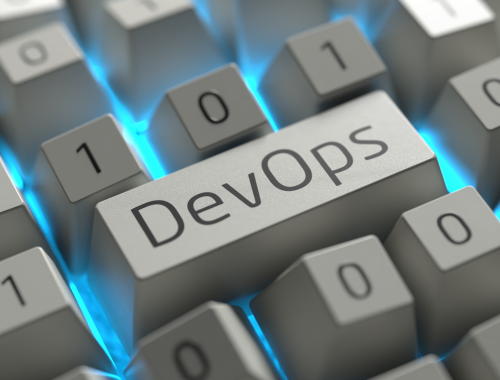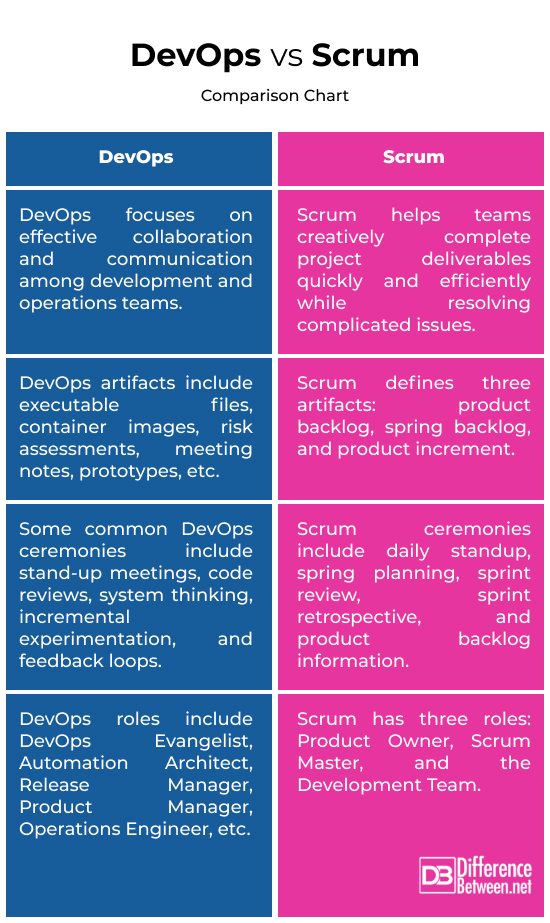Difference Between DevOps and Scrum
We live in a digital world where software takes the front seat. It has enabled organizations or businesses to deliver better products at a faster pace. Software has helped them to create smarter and more customized products that are better suited to user needs. DevOps and Scrum are two such important tools that help organizations deliver programs quickly and reliably. DevOps focuses on automating IT operations, while Scrum defines how to solve problems by managing software development projects. Let’s take a look at some key differences between DevOps and Scrum.

DevOps
DevOps, a portmanteau of development and operations, is a set of practices and cultural philosophy that focuses on improving communication and collaboration between development and IT operations teams. The goal is to facilitate faster product delivery and improve the quality of software by automating the delivery and deployment process while removing the bottlenecks. DevOps is transforming the way engineering teams collaborate to create and release software. It’s an encompassing philosophy that inspires diverse implementations across an organization or industry.

Scrum
Scrum is a project management framework based on the idea of iterative development, where teams work in short sprints to deliver working software. Scrum emphasizes collaboration, transparency, and continuous improvement. It is a way of organizing a project to expose whether your approach is generating desired results. If you want to get something done, Scrum provides a structure for faster results and increased efficiency. Scrum enables teams to adapt and respond to changes quickly, fostering transparency, teamwork, and continuous improvement throughout the development process.
Key Differences between DevOps and Scrum
Concept
– DevOps is a set of practices and cultural philosophies of collaboration and ownership to accelerate the software development lifecycle, from ideation to production to operations. It focuses on effective collaboration and communication among development and operations teams.
Scrum is a project management framework that falls under the umbrella of agile project management. It’s a methodology that helps software development teams to generate value through iterative and incremental processes.
Artifacts
– DevOps artifacts are by-products created during the software development lifecycle, like roadmaps that can be used to trace the entire process. DevOps uses a variety of artifacts, such as CI/CD pipelines, infrastructure as code, executable files released for users, container images, risk assessments, meeting notes, prototypes, etc.
Scrum artifacts are nuggets of key information used by scrum teams and stakeholders to understand the product under development. Scrum defines three artifacts: product backlog, spring backlog, and product increment.
Ceremonies
– Ceremonies are cultural rituals or specific actions that are performed within an organization. Some common DevOps ceremonies include stand-up meetings, code reviews, system thinking, incremental experimentation, and feedback loops.
Scrum ceremonies are also called scrum events and include daily standups, spring planning, sprint review, sprint retrospective, and product backlog information.
Roles
– Continuous integration and continuous delivery (CI/CD) are closely aligned with DevOps. Some essential DevOps roles you need on your team include the DevOps Evangelist, Automation Architect, Release Manager, Product Manager, Operations Engineer, Security Engineer, and more.
Scrum has three main roles: Product Owner, Scrum Master, and Development Team. The Scrum Master serves the Development Team, which serves the Product Owner. The Product Owner serves the stakeholders.
DevOps vs. Scrum: Comparison Chart

Summary
In a nutshell, DevOps is a set of practices that combines development and operations to enable faster delivery of products, improved functionality, and fearless innovation. Engineering is not the only side of an organization that benefits from DevOps; the business side will benefit too. Scrum is a more focused approach to managing software development projects. Scrum is an incremental, iterative approach to getting things done, one step at a time. Scrum roles are distinct, with individuals or teams given the freedom and tools to get things done.
FAQs
What is the main difference between DevOps and Agile?
DevOps focuses on effective collaboration and communication between development and operations teams, while Agile is a software development framework that focuses on iterative and incremental development.
Is DevOps part of the Scrum team?
No, DevOps is not part of the Scrum team. However, they can work together to help solve business problems.
What is the Scrum model in DevOps?
Scrum isn’t a methodology; it is a combination of the Scrum framework’s iterative development approach with DevOps practices for continuous integration, delivery, and deployment. It’s a way of solving problems collaboratively in short cycles.
Is Agile better than DevOps?
DevOps and Agile are complementary approaches, not rival ones. They cover several facets of the software development lifecycle and can be combined for improved results.
Is DevOps always Agile?
DevOps can be seen as an evolution of agile practices and principles, but it can be implemented independently or in conjunction with other methodologies.
Is Agile used in DevOps?
DevOps teams often use agile principles and practices to promote flexibility, collaboration, and continuous improvement throughout the software development and delivery process.
- Difference Between Caucus and Primary - June 18, 2024
- Difference Between PPO and POS - May 30, 2024
- Difference Between RFID and NFC - May 28, 2024
Search DifferenceBetween.net :
Leave a Response
References :
[0]Rossberg, Joachim. Agile Project Management with Azure DevOps: Concepts, Templates, and Metrics. New York City, United States: Apress, 2019. Print
[1]Freeman, Emily. DevOps For Dummies. New Jersey, United States: John Wiley & Sons, 2019. Print
[2]Layton, Mark C. and David Marrow. Scrum For Dummies. New Jersey, United States: John Wiley & Sons, 2018. Print
[3]Longbottom, Clive. “Scrum vs. DevOps: Are they intertwined or redundant?” TechTarget, 23 June 2022, techtarget.com/searchitoperations/tip/Scrum-vs-DevOps-Are-they-intertwined-or-redundant.
[4]Image credit: https://www.canva.com/photos/MAFYduobmVg-devops-software-development-operations-programmer-administration-system-life-cycle-quality-coding-building-testing-release-monitoring-data-flow/
[5]Image credit: https://www.canva.com/photos/MAECOMAokhk-scrum-inscription-on-white-paper/
